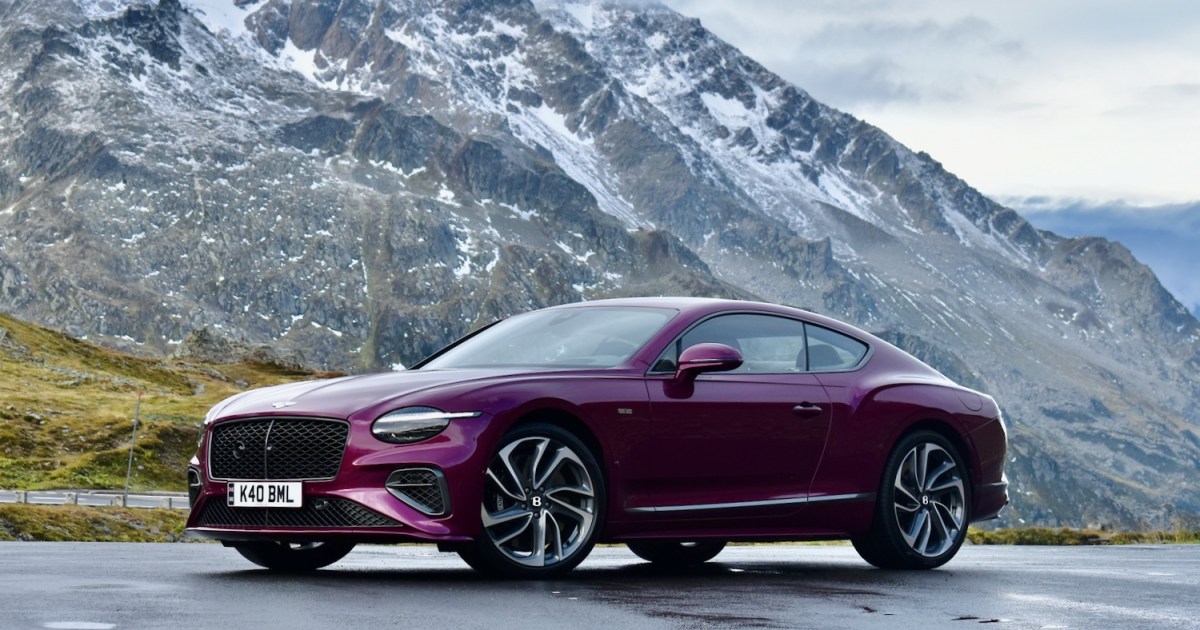Every car brand is navigating a course to an electrified future, but that brings unique challenges if you have to convince wealthy people to buy a car with a plug due to something as pedestrian as emissions standards.
Bentley has sold plug-in hybrids for a few years now, but the century-old British automaker is now shifting that effort into a higher gear. The 2025 Bentley Continental GT Speed (and its GTC Speed convertible sibling) isn’t just an addition to the lineup; it replaces the non-hybrid GT Speed as the sportiest regular production version of Bentley’s signature model.
When it launched in 2003, the original Continental GT brought Bentley out of the shadows, combining the opulence of a handbuilt luxury car with the style and performance that had mostly lain hidden like a recessive gene since Bentley’s glory days early in the previous century. Now the new Continental GT aims to once again redefine Bentley as a brand that fully embraces electrification rather than merely tolerating it.
Design and interior
At first glance, the new Continental GT Speed doesn’t look that different from its predecessor. But nearly every surface has been changed, creating a coupe and convertible that are tauter and sleeker than before.
The most noticeable difference is upfront, where the previous four-headlight arrangement has been replaced by a larger pair of round lights with daytime-running-light slashes that make the Continental GT look like it’s attempting some weird Instagram makeup look when stationary. On the road, though, the running lights emphasize the upright grille, giving the car a more imperious appearance.
Recalling classic Bentleys, , the Continental GT still sports prominent rear fenders that loom large in the side mirrors, with creases like a well-ironed pair of pants. At the back, designers reshaped the sheet metal to produce aerodynamic downforce without the need for a separate pop-up rear spoiler, and squashed the taillights into a more elliptical shape. This looks great from the side, where the streamlined tail nicely trails off like it’s billowing in the wind. But from behind, this Bentley looks too much like a Ford Mustang and not a six-figure luxury car.
Nearly every surface has been changed for a tauter and sleeker look.
That rear-end treatment also creates a fairly small trunk aperture, which means customers will likely struggle to fit the requisite bag of golf clubs in the trunk. And while the Continental GT is technically a four-seater, adults will only find the rear seats tolerable for short distances. Still, that the back seats are usable at all is a major coup for the Continental GT, as that’s not something that can be said of rival four-seaters like the Aston Martin DB12 and Maserati GranTurismo.
The driver and front-seat passenger also enjoy a greater feeling of spaciousness than in most two-door cars; the Continental GT is more luxury car than sports car in this regard. That feeling of spaciousness is diminished somewhat by the thick roof pillars, high dashboard, and high windowsill line, which limit outward visibility somewhat, although generously sized exterior mirrors help a bit.
Like all Bentleys, the Continental GT’s interior is an exercise in opulence. The dashboard primarily exists as a showcase for high-quality wood, brushed aluminum, or carbon fiber trim, while the deep-pile carpets and leather seats are living-room-worthy. The leather upholstery is also available in nearly as many colors as the exterior, from green and gray to purple and magenta.
Tech, infotainment, and driver assist

Like the exterior design, tech features are more evolution than revolution. But that’s because the Continental GT made so much progress in this area with its last redesign.
The optional Bentley Rotating Display is a 12.3-inch touchscreen that can hide away behind a matching piece of dashboard trim or a set of three analog gauges. The screen itself is great to use (in part because the infotainment system is based on Audi’s excellent MMI), but it’s also nice to be able to stow it away when the car is parked. It’s certainly a classier solution than the expanses of shiny black plastic other automakers use to help screens blend in better with dashboards.
It’s nice to be able to stow the screen away when the car is parked.
Wireless Apple CarPlay and Android Auto are still included, along with a 10-speaker, 650-watt Bang & Olufsen audio system. Customers can also pay extra for a 16-speaker, 1,500-watt Bang & Olufsen system with illuminated speaker grilles or an 18-speaker, 2,200-watt Naim system with bass transducers in the front seats, as well as a head-up display and night vision. In keeping with current trends, the updated Continental GT adds an app store that lets your download Spotify, YouTube, and other apps directly to the car.
The Continental GT is equipped with expected driver-assistance features like adaptive cruise control, lane-keep assist, and blind-spot monitoring. Information about these features is presented clearly in the instrument cluster, despite having to share space with gauges and drive mode and hybrid system readouts. A new remote parking system lets the driver park or summon the car using a smartphone. Hyundai has offered a similar feature for a few years now, but trying it with a car this expensive requires a new level of confidence in this tech.
Driving experience

As the sportiest Continental GT (barring limited-edition models), the Speed gets the honor of debuting Bentley’s new plug-in hybrid powertrain. This is not the six-cylinder version previously seen in the Bentayga SUV and Flying Spur sedan. Instead, a 4.0-liter twin-turbocharged V8 drives all four wheels through an eight-speed automatic transmission with an integrated electric motor. A 25.9-kilowatt-hour battery pack (85% of the capacity of which is usable) sits behind the rear axle to improve weight distribution.
The plug-in hybrid setup replaces a twin-turbo 6.0-liter W12 that was unique in terms of its configuration, if not the actual seat-of-the-pants experience. Predictably, the Continental GT Speed is more powerful than before to help assuage nostalgia for the W12. Its 771 horsepower and 738 pound-feet of torque make this the most powerful series production Bentley road car ever. Bentley also quotes a zero-to-60 mph of 3.1 seconds — 0.4 second quicker than the old car — and a 208 mph top speed that’s downright laughable in something with this many luxuries.
Electric mode is definitely not the main attraction, but it is a nice addition.
The real takeaway is that the new plug-in hybrid powertrain combines the endless torque of the W12 with the superior driving characteristics and sound of the non-hybrid V8 powertrain Bentley also offered in the outgoing Continental GT. The new GT Speed has the lighter-feeling front end of the previous V8 car, making it feel more eager to turn into corners. And the engine’s raspy sound — a classic eight-cylinder exhaust note remastered and in high definition — is so addictive that we didn’t make as much use of electric mode as we probably should have.
Electric mode is definitely not the main attraction of the Continental GT Speed, but it is a nice addition. As nice as the V8 exhaust note is, turning down the volume enhances the feeling of luxury, and is probably more considerate of passengers and bystanders who might not be enamored with the sound of burning hydrocarbons. In its less-aggressive drive modes, the GT Speed also did a good job of balancing gasoline and electric power, while keeping the response to the right pedal consistent.
Speed models also come standard with Bentley’s full array of active chassis features, including adaptive suspension (now with twin-valve dampers for more precise control), rear-wheel steering, an electronic limited-slip rear differential, and torque vectoring. As before, these make the Continental GT impressively nimble for such a big car. Still, it feels absolutely enormous on proper driving roads. And you’ll never make full use of all of that power.
Electric range and charging

Official U.S. fuel economy and electric range ratings weren’t available at the time of publication, but Bentley claims up to 50 miles of electric range on the more lenient European WLTP testing cycle. Electric mode is available at up to 87 mph and/or three-quarters throttle, making it fairly usable in the real world. Unlike some plug-in hybrids, we didn’t need to treat the accelerator pedal like an eggshell in order to keep the Continental GT Speed from switching on its gasoline engine.
An 11-kilowatt onboard charger can finish a full recharge in 2.7 hours, according to Bentley, but in mixed driving, it’s fairly easy to keep the battery from running down in the first place. Strong regenerative braking helps keep the battery topped up without interfering too much with the feel of the friction brakes (with your choice of massive iron or carbon-ceramic rotors). Hit a twisty road with some elevation change, and the state of charge can be maintained.
How DT would configure this car

We drove well-equipped First Edition GT Speed coupes and GTC Speed convertibles with base prices of $302,100 and $332,200, respectively. Each car had about $75,000 worth of options, among them the $39,940 First Edition spec ($41,190 for the convertible) First Edition models include the Bentley Rotating Display and the Touring Specification, which bundles in the key driver aids. These cars also had the carbon-ceramic brake option that, at $18,820, had us wondering what the standard brakes felt like.
There’s no point in getting an off-the-rack Bentley, so we’d also spend some time on the online configurator playing around with paint colors, interior trim, leather hides, and other design details to make our car special (for a little extra dough, naturally).
Returning customers will find an improved version of an already-great car, but those focused on the carbon footprint of their ostentatious two-door luxury car also have all-electric options in the form of the Rolls-Royce Spectre coupe and Maserati GranTurismo Folgore coupe and GranCabrio Folgore convertible. Rolls-Royce, Bentley’s onetime owner, places a similar emphasis on craftsmanship and old school luxury, while Maserati covers the sporty angle.
The Continental GT Speed isn’t a big leap for plug-in hybrids. Cars like the Lamborghini Revuelto and Mercedes-AMG S63 E Performance pull off the same trick of preserving a specific kind of internal-combustion driving experience with hybridization. But it’s hard to think of a better use of this technology than keeping around the unique combination of sportiness and luxury that is the Bentley Continental GT to start yet another new era for this storied automaker.
Read the full article here














